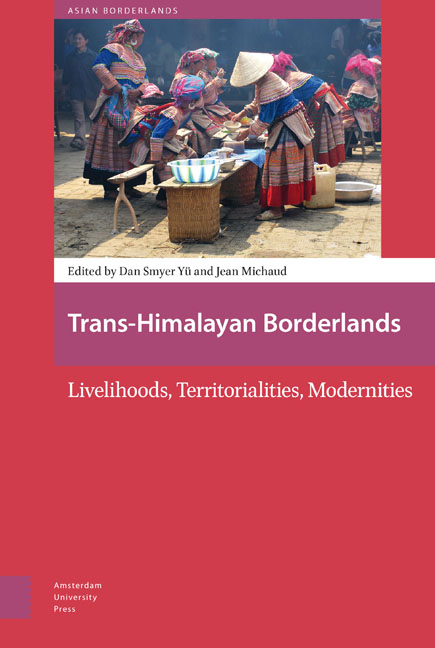Book contents
- Frontmatter
- Contents
- Acknowledgements
- Introduction: Trans-Himalayas as Multistate Margins
- I Territory, Worldviews, and Power Through Time
- 1 Adjusting Livelihood Structure in the Southeast Asian Massif
- 2 The Properties of Territory in Nepal’s State of Transformation
- 3 Trans-Himalayan Buddhist Secularities: Sino-Indian Geopolitics of Territoriality in Indo-Tibetan Interface
- 4 Buddhist Books on Trans-Himalayan Pathways: Materials and Technologies Connecting People and Ecological Environments in a Transnational Landscape
- 5 Seeking China's Back Door: On English Handkerchiefs and Global Local Markets in the Early Nineteenth Century
- II Livelihood Reconstructions, Flows, and Trans-Himalayan Modernities
- 6 Contested Modernities: Place, Subjectivity, and Himalayan Dam Infrastructures
- 7 Plurality and Plasticity of Everyday Humanitarianism in the Karen Conflict
- 8 Being Modern: Livelihood Reconstruction among Land-lost Peasants in Chenggong (Kunming)
- 9 Tibetan Wine Production, Taste of Place, and Regional Niche Identities in Shangri-La, China
- 10 Tea and Merit: Landscape Making in the Ritual Lives of the De’ang People in Western Yunnan
- 11 In-between Poppy and Rubber Fields: Experimenting a Transborder Livelihood among the Akha in the Northwestern Frontier of Laos
- 12 A Fortuitous Frontier Opportunity: Cardamom Livelihoods in the Sino-Vietnamese Borderlands
- Conclusion: Frictions in Trans-Himalayan Studies
- Index
Conclusion: Frictions in Trans-Himalayan Studies
Published online by Cambridge University Press: 12 December 2020
- Frontmatter
- Contents
- Acknowledgements
- Introduction: Trans-Himalayas as Multistate Margins
- I Territory, Worldviews, and Power Through Time
- 1 Adjusting Livelihood Structure in the Southeast Asian Massif
- 2 The Properties of Territory in Nepal’s State of Transformation
- 3 Trans-Himalayan Buddhist Secularities: Sino-Indian Geopolitics of Territoriality in Indo-Tibetan Interface
- 4 Buddhist Books on Trans-Himalayan Pathways: Materials and Technologies Connecting People and Ecological Environments in a Transnational Landscape
- 5 Seeking China's Back Door: On English Handkerchiefs and Global Local Markets in the Early Nineteenth Century
- II Livelihood Reconstructions, Flows, and Trans-Himalayan Modernities
- 6 Contested Modernities: Place, Subjectivity, and Himalayan Dam Infrastructures
- 7 Plurality and Plasticity of Everyday Humanitarianism in the Karen Conflict
- 8 Being Modern: Livelihood Reconstruction among Land-lost Peasants in Chenggong (Kunming)
- 9 Tibetan Wine Production, Taste of Place, and Regional Niche Identities in Shangri-La, China
- 10 Tea and Merit: Landscape Making in the Ritual Lives of the De’ang People in Western Yunnan
- 11 In-between Poppy and Rubber Fields: Experimenting a Transborder Livelihood among the Akha in the Northwestern Frontier of Laos
- 12 A Fortuitous Frontier Opportunity: Cardamom Livelihoods in the Sino-Vietnamese Borderlands
- Conclusion: Frictions in Trans-Himalayan Studies
- Index
Summary
Abstract
Several undercurrents run throughout this book that exemplify the types of frictions characteristic of the trans-Himalayan situation. I briefly reflect here upon four that cut across our case studies transversally and point to telling overlapping implications: livelihoods, modernity, agency, and borderlands. I argue that bringing together approaches that can build on locally rooted understandings of livelihoods, while being acceptable to the state, should be our aim. It is where the challenge lies for creating and supporting truly sustainable livelihoods and durable life projects.
Keywords: Trans-Himalayas, livelihoods, modernity, agency, borderlands, current issues
Anna L. Tsing has stated that: ‘Cultures are continuously coproduced in the interactions I call “friction”: the awkward, unequal, unstable, and creative qualities of interconnection across difference’ (2005: 4). She added: ‘As a metaphorical image, friction reminds us that a heterogeneous image and unequal encounters can lead to new arrangements of culture and power’ (5; see also Miyasaki Porro 2010). As this book demonstrates vibrantly, in the highlands straddling the borderlines across the trans-Himalayan region, transformative pressures and frictions are reshaping on a daily basis, in known as much as in unpredictable fashion, the livelihoods of thousands of ethnic minority communities. The lives of over 150 million people are impacted directly and many more indirectly.
All these pressures are closely linked to the agrarian transition (Mohanty 2016; Kelly 2011), incorporating great market integration, and a drive toward modernity (Taylor 1999). The frictions the agrarian transition causes and exposes across the highlands simultaneously destabilize, reformat, and mobilize responses regarding the locally rooted livelihoods of communities, their worldviews, and their alternative takes on modernity (Gaonkar 2001). People in this vast borderland on the fringes of multiple nations are constantly addressing conflicting social, political, and environmental conditions and imperatives while consistently refining their creative adaptation to change and their expertise of the ecological systems they inhabit. Far from being victims of these processes and of ecological determinism, they construct and uphold complex livelihoods and activate their agency to negotiate state policies and market normalization. In Tsing's words (2005: 5): ‘Speaking of friction is a reminder of the importance of interaction in defining movement, cultural forms, and agency.’
- Type
- Chapter
- Information
- Trans-Himalayan BorderlandsLivelihoods, Territorialities, Modernities, pp. 285 - 298Publisher: Amsterdam University PressPrint publication year: 2017



